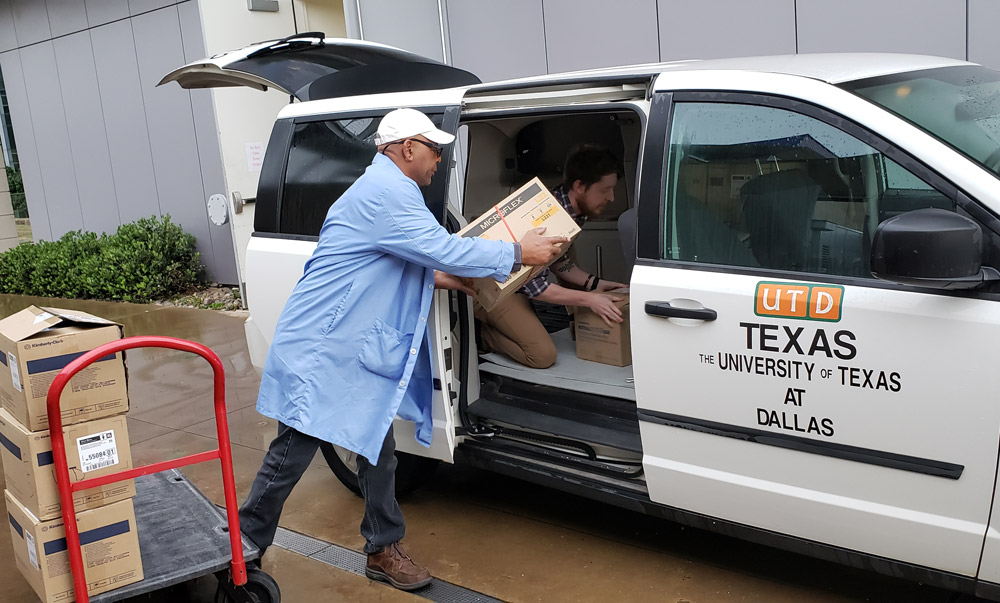UT Dallas Donates Protective Medical Gear to Parkland in COVID-19 Response
By: Stephen Fontenot | March 27, 2020

As the number of COVID-19 cases increases in communities around the U.S., many of the health care heroes charged with stemming the tide and saving lives find themselves at risk due to shortages of personal protective equipment (PPE).
The University of Texas at Dallas has responded to the call for more supplies by donating masks, gowns, gloves and more to Parkland Health & Hospital System, Dallas County’s public hospital and one of the nation’s largest public health systems, averaging 1 million patient visits annually.
By the Numbers
Total count of supplies sent to Parkland from UT Dallas:
Exam gloves: 70,010
Surgical gloves: 2,125
Face masks: 1,100
N95 masks: 69
Isolation gowns: 80
Shoe covers: 100
On March 21, staff members from UT Dallas’ Office of Research delivered more than 72,000 gloves, 1,100 face masks and 69 N95 masks provided by faculty members from across the University’s schools and laboratories.
“Parkland is playing a vital role in health care delivery, especially to some of the most vulnerable people in our community,” said Dr. Joseph Pancrazio, vice president for research and professor of bioengineering at UT Dallas. “It was incumbent upon us to think differently about this, to set an example for our region. In this situation, the supplies that we have must be made available for the greater need.”
Pancrazio explained that many of the supplies needed by hospitals facing the pandemic are common at Tier One research universities like UT Dallas.
“As we’ve transitioned some of our research activities to functions that can be done remotely — such as writing papers and analyzing data — our laboratories have supplies that can be essential for maintaining the health and well-being of the DFW community and our health care providers,” he said.
Helping Campus
In addition to the equipment for Parkland, the Office of Research donated N95 masks to first responders in the UT Dallas Police Department and workers in Facilities Management who are cleaning buildings on campus.
Pancrazio turned to Kathan McCallister, assistant vice president of research operations, to organize the effort. Members of the UT Dallas faculty were quick to respond — eight labs contributed to the first batch of donations, with another following the next week.
“This has been a physical manifestation of the UT Dallas community’s commitment to serve,” McCallister said. “Watching people come together — this is what we do; this is a commitment that’s already there.”
Dr. Sheel Dodani BS’07, assistant professor of chemistry in the School of Natural Sciences and Mathematics, said PPE of some sort is used by virtually every researcher who runs a laboratory.
“Members of my lab use lab coats, goggles and gloves on a daily basis. We are always stocked with the essentials,” she said. “Like many others across the country, I made the decision to shut my lab down to help flatten the curve. Health care professionals at Parkland and all over the world are fighting the real battles. We must thank them by doing our part by donating what we can and — most importantly — staying home.”
“Parkland is playing a vital role in health care delivery, especially to some of the most vulnerable people in our community. It was incumbent upon us to think differently about this, to set an example for our region. In this situation, the supplies that we have must be made available for the greater need.”
Dr. Joseph Pancrazio, vice president for research at UT Dallas
Dr. Michael Kilgard, Margaret Fonde Jonsson Professor of neuroscience in the School of Behavioral and Brain Sciences, said that working with Parkland, the primary teaching hospital for UT Southwestern Medical Center, is a natural UT System collaboration.
“Here at the Texas Biomedical Device Center at UT Dallas, we have partnered with UT Southwestern for years to develop and test new therapies for neurological disorders,” said Kilgard, interim executive director and chief science officer at the center. “We are happy to do everything we can to support the physicians and the extraordinary care they are providing to so many.”

Pancrazio emphasized that the donations represent the University playing its intended role as a community partner and in spearheading opportunities that help strengthen North Texas.
“People across our schools and laboratories recognize that this is the right thing to do, and I’m very proud of them,” he said. “They understand that this is a time to have an impact for the community. Without a doubt, the faculty has stepped up and will continue to step up.
“The health care providers are the heroes here. We need to support them throughout the community.”
Media Contact: Stephen Fontenot, UT Dallas, 972-883-4405, stephen.fontenot@utdallas.edu, or the Office of Media Relations, UT Dallas, (972) 883-2155, newscenter@utdallas.edu.





